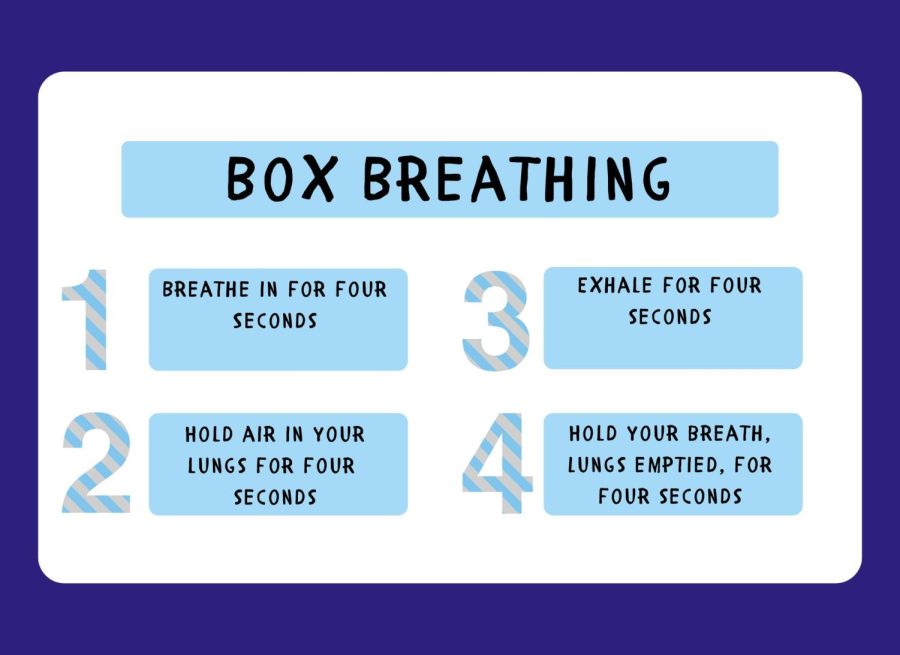The science of stress management
Lincoln psychology teacher Steve Lancaster recommends box breathing as a strategy to reduce stress in any situation. This graphic shows the steps for box breathing.
January 11, 2023
The term stress was coined in 1936 by Hans Selye to describe the “nonspecific response of the body to any demand.” In other words, stress is the fight or flight response. So why do tests trigger our fight or flight?
“Tests are experienced by your subconscious autonomic nervous system as a potential threat,” said Lincoln psychology teacher Steve Lancaster. “The same biology that would help you fight a bear if you came across one in the woods is turning on in the face of a math test. Unfortunately, [this] biological system interferes with the ability to think clearly.”
Many strategies exist to minimize the negative effects of stress, such as sleep, physical exercise and breathing exercises.
The CDC recommends teenagers sleep eight to 10 hours every night; sleep deprivation has been linked to lower grade point averages and less efficient learning. Sleep impacts learning positively because it strengthens memories formed throughout the day by allowing the brain to go back through these memories and store them. Since learning is based on memory, a lack of sleep makes it significantly harder to retain information and leads to difficulty thinking clearly.
Many students commonly stay up late studying, so school psychologist Sarah Muska says it is important to make sure that the quality of the sleep you do get is good.
“The quality of your sleep matters,” said Muska. “Even if you’re not going to get quite as much sleep, make sure that it’s a deeper sleep.”
To ensure a healthier sleep, avoid looking at screens before bed and don’t do your homework where you sleep as it leads to an association with your bed and work.
Lancaster believes that students often feel overwhelmed, leading to procrastination and lack of sleep.
“Feeling overwhelmed can easily push people to shut down and turn to some other activity that temporarily relieves their stress, such as scrolling through TikTok [or] binging a TV show,” said Lancaster. “Of course this is a setup for even greater stress… as the task moves closer to its deadline without any progress being made.”
Fortunately, there are strategies to prevent procrastination such as to-do lists. Breaking down a large task into smaller parts makes it less intimidating, and even the act of simply making a plan to complete a task reduces the anxiety associated with it.
Muska recommends setting up a system of rewards. Getting rewards for completing tasks gives you a boost of endorphins which helps you look forward to finishing.
“Set a reward for yourself, like doing your favorite activity after you get something challenging done,” said Muska.
In fact, taking a break of even five minutes from work can improve concentration and reduce stress. It may seem counterintuitive, but leaving time in your schedule to take breaks from schoolwork makes you more productive. Regular exercise is also extremely helpful, as it reduces stress and leads to improved sleep.
Taking brief breaks during tests has the same positive effect. Additionally, both Lancaster and Muska agree that breathing exercises are helpful.
“One strategy that has a lot of research support, works for many people and is really easy to try is controlled breathing,” said Lancaster. “It helps you clear your head… so that you can re-engage your brain.”
He suggests a method called box breathing, which involves breathing in for four seconds, holding your breath for four seconds, exhaling for four seconds, holding your breath again for four seconds and repeating.
“The beauty of box breathing is that it’s inconspicuous, meaning you can practice it anywhere, at any time,” said Lancaster.
Stress management techniques are not a one size fits all solution, so it is important to try many things and see what works for you.
“There is no one best technique [but] there are many useful tools,” said Lancaster. “People have to try many of them before discovering the ones that work best for them.”



